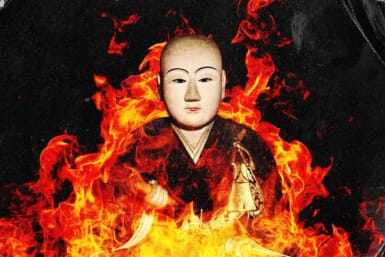DRINKS AFTER WORK
There are basic bits of information about doing business in Japan which by now are familiar to everyone contemplating the local market.
If, for example, the Japanese “yes” is still being mistaken for the English language “yes,” then whoever is making the mistake should not be allowed out of the Hotel Okura. (By the same token, if there’s a soul alive who does not recognize the significance of introducing new ideas at the appropriate level for “committee review,” then that soul has clearly been spending the last decade marooned on a desert isle somewhere.)
Another bit of information about doing business in Japan has to do with “drinks after work.” Who doesn’t know that the rigid hierachy within each office restricts the flow of valuable and informative “communication,” and that the only way to transcend the barrier inherent in the system is for people of various levels within the hierarchy to get shit-faced together after work? These things are basic. (An interesting indication of the Japanese attitude toward accountability after drinking is the fact that until a relatively few years ago, intoxication was a defense in the event of bodily injury or property damage resulting from automobile accidents.)
“Drinks after work,” however, requires the active participation of those within the hierarchy—including foreign management. Understanding the Japanese “yes,” or knowing how to introduce new ideas are mere textbook tactics. Drinking liters of beer, forcing down glass after glass of mizu wari and eating chicken-on-a-stick are part of the Real World in Japan.
Everyone knows it’s important—but proper behavior during these sessions is not described in any text. One must survive and play the events during “drinks work” as they develop. And that can bring one to a level of cultural and social involvement touching upon core sensibilities. Screwing-up can be politically fatal.
Max Danger suggests that there are basic rules which must be followed in virtually all situations. Variance will put one at risk, and this author accepts no responsibility for deviance from the following basic precepts.
I. Never strike a business colleague over the head with a bottle of beer during a “drinks after work” session. Conversation may reach the intense phase, and ideas may be presented which are at odds with carefully developed Head Office programs, but physical mayhem is surprisingly counter-productive. Arm-wrestling over whether or not to establish an export division is also not done. The ground rules are Japanese, and open confrontation on the physical plane is not accepted. (Pouring beer into the colleague’s mizu wari glass is an effective alternative to a punch in the nose.)
II. Never laugh out loud when a business colleague (or especially a customer) introduces a pretty young girl as his “administrative assistant.” Listen, we’re dealing in a different culture here. If a colleague feels that the “drinks after work” sesssion should involve careful note-taking by a 27-year-old with great legs, who are we to question the maneuver? After all, hierarchical barriers are being transcended, and the legs part may be coincidental. As an aside, it’s probably not a good idea to take seriously the random and accidental physical encounters—in the bumping, leaning and rubbing category—with the administrative assistant over the course of the evening. Remember, notes are being taken.
III. Never assume that “drinks after work” begin with drinks. Max has eaten most of a pizza, spaghetti with squid, mysterious meat balls and a whole plate of sweet and sour something before the first drinks arrived. Things don’t get serious until the plastic glass-like container with ice cubes and the black bottle of whiskey appears. (Watch out for the choco-sticks. Chocolate and whiskey cloud perspective.)
IV. Never plan on the evening being over just because you’re standing with 11 people on the sidewalk outside the first “drinks after work” establishment. One person, invariably, will live three hours from Tokyo and must catch a train somewhere. Everyone else will want to go to a second establishment. It may take 15 or 20 minutes of standing on the sidewalk and shuffling back and forth before a decision is made, but once made, you must attend the second party. After all, everyone else lives two hours away, and you’re within a half hour of Azabu.
V. Never take the remark that you’re a nice guy at face value—it may be stated as a surprising and recently discovered observation in direct contrast with your normal standard operating procedure in the office. Max once believed he had conquered the hostility he felt emanating from the company union representative. Max was told he was a “nice guy” during one of the “drinks after work” sessions. It had to do with his willingness to sing “I Did It My Way” at a karaoke bar. It meant that the union maintained its previous strong position in subsequent negotiations, but now a “nice guy” was unaccountably standing in the way of progress and the fortunes of the laboring class. This complicated the issue.
VI. Never think that throwing up on the sidewalk outside the last “drinks after work” place changes basic attitudes with in the staff. To be around when these things happen is important—whether you are the throwee or thrower—but specific policy implementation will not be immediately affected. One must develop the reputation of handling these things with aplomb over a period of time before substantive results in management effectiveness can be ascertained. It helps if one learns to treat these events not unlike one would treat hiccups in the West.
VII. Never refuse the first taxi “drinks after work” staff finds for you. If you do, you’ll lose face in the “importance game” we’re all playing. Not only that, you may have to walk home from Akasaka.
VIII. Never tell your wife you had a “marvelous time” with the crew after work. In the first place, it probably won’t be true. In the second place, unless you clobbered a guy over the head with a beer bottle, you’ll probably be invited back. Either way, you lose. You may as well keep peace in the family.
It ain’t easy out here in the field.








